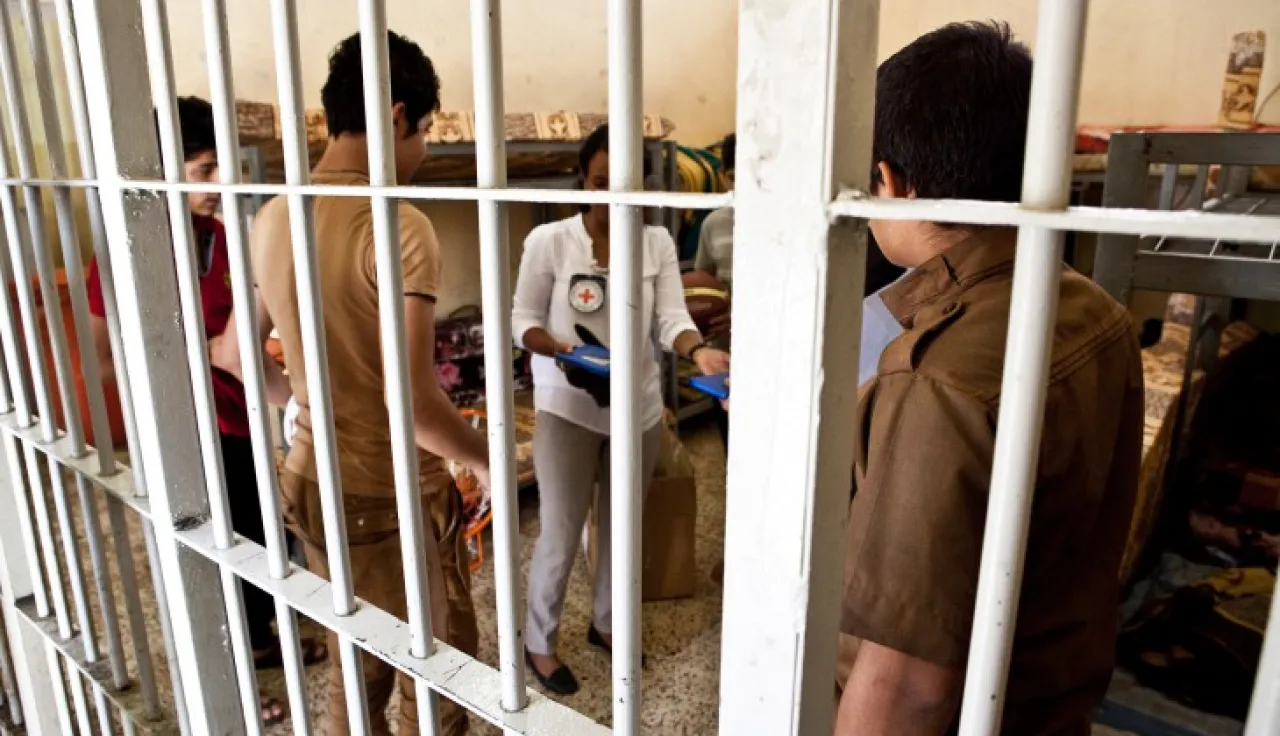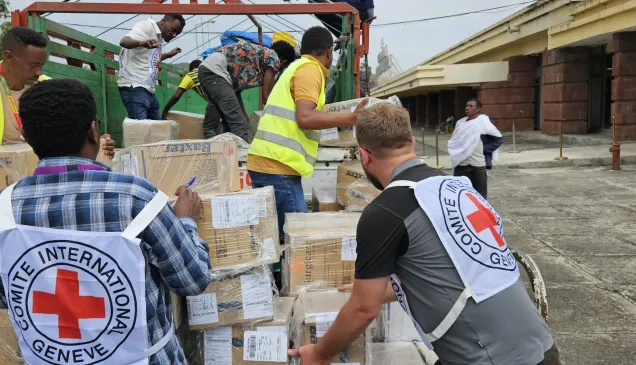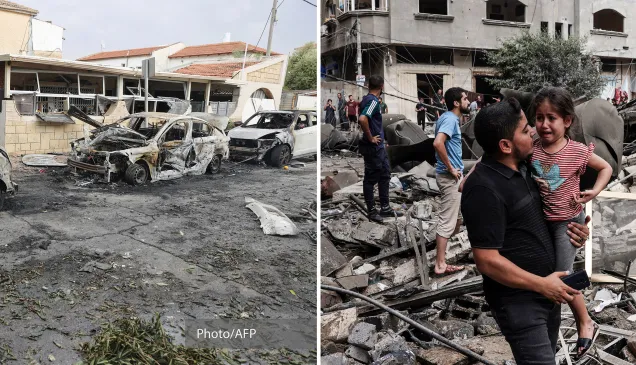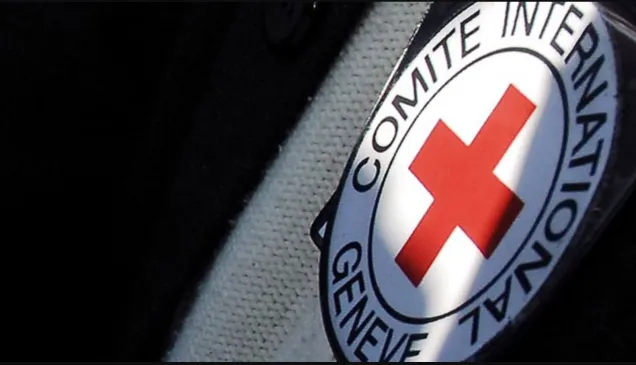Frequently Asked Questions: Our work on behalf of people in detention

Frequently asked questions about our work on behalf of people deprived of their liberty
-
Detainees, by virtue of their situation, are in a position of vulnerability. The ICRC works in places of detention to help ensure that the treatment of detainees and the conditions they are held in are compatible with international legal frameworks.
Based on our visits to places of detention and the assessments we make during these visits, we work with authorities to provide advice and support initiatives that can help them fulfill their responsibilities. This includes work to improve the management of places of detention, strengthen health services and improve the material conditions of detention.
We seek to alleviate the suffering of the families of detainees, particularly by restoring communication between detainees and their relatives. In some cases, we also support former detainees, facilitating their return to society.
-
States are obligated to treat people deprived of liberty with humanity and dignity in all circumstances. In armed conflict, international humanitarian law (IHL) sets out standards for the treatment and conditions of people deprived of liberty and gives the ICRC a supervisory role. Through the fulfilment of this role, the ICRC helps to ensure that detainees' dignity and physical integrity are respected and that they are treated in accordance with IHL and other applicable laws and standards. Whenever necessary, the ICRC helps detaining authorities fulfil their obligations in this respect. The ICRC also plays a vital role in strengthening or reconnecting detainees with their families when that connection has been lost.
-
To guarantee the effectiveness and credibility of its visits, the ICRC must be enabled to operate in accordance with the following working procedures:
- Unrestricted access to all detainees, at all stages of their detention, whatever status has been conferred on them by the authorities;
- Access to all the places, and to all premises used by and for the detainees in each place of detention, wherever they are held;
- The opportunity to speak freely and in private (without witnesses), for as long as may be necessary, with any detainee of its choice;
- The right to repeat its visits as often as the ICRC deems necessary for the appropriate follow-up of detainees;
- To receive from the authorities, upon request, precise information concerning the identity, status and whereabouts of the detainees, and have authorization to register such information during its visits;
- To be allowed to restore and preserve links between detainees and their families.
Further, the ICRC generally only discusses its findings in a confidential and bilateral manner with the concerned authorities in order to build trust and work with authorities to improve the treatment and conditions of detainees.
-
People in detention in international armed conflicts: States are obliged to allow ICRC access to all people detained or interned in relation to an international armed conflict, in particular prisoners of war and interned civilians, who are protected by the Third and Fourth Geneva Conventions respectively. The ICRC must also be given access to persons protected by the Fourth Geneva Convention who are in criminal detention.
People in detention in non-international armed conflicts or other situations of violence: The ICRC will seek to visit people - who are detained (either by states or non-state armed groups) in direct connection with the situation - these are sometimes known as “security” or “political” detainees.
-
The ICRC has been mandated by the international community, under the Geneva Conventions, to ensure that international humanitarian law is applied fully. The ICRC was also given the right to visit Prisoners of war (POWs) and civilian internees (CI) who are protected by the Geneva Conventions.
- The ICRC's main concern is that prisoners of war or civilian internees are treated according to international humanitarian law. The objective of the law is to protect humanity during the extreme situations that is armed conflict, and to ensure the preservation of the dignity and humane treatment of those interned or detained.
- The visits help to ensure respect for the life and dignity of prisoners of war and interned civilians by reminding the detaining authorities, wherever necessary, that the captives' treatment and their conditions of detention must comply with international humanitarian law.
ICRC visits also give the persons held captive the opportunity to renew and maintain contacts with their families. - Visits to places of detention allow the ICRC to register persons deprived of freedom in order to help prevent disappearances.
- The ICRC maintains a direct and confidential dialogue on these subjects with the authorities in charge; the delegates' findings are discussed with the authorities and described in confidential reports.
- Delegates must be allowed to see all prisoners and internees falling within the ICRC's mandate and to have access to all places where they are held; interviews are held in private, and the ICRC must be allowed to repeat the visits as often as necessary.
-
If a member of your family has been arrested, you can contact your nearest ICRC office to find out how we can help you.
Frequently asked questions about the role of the ICRC as a neutral intermediary in release operations
-
The ICRC has extensive experience organizing repatriations of prisoners of war (POWs) and civilian internees in international armed conflicts, understanding that prolonged separation from loved ones causes immense suffering. These repatriations can occur during active conflict for those with particular vulnerabilities (such as terminal illness, serious wounds, or advanced age), at the end of hostilities, or when peace agreements are reached.
In non-international armed conflicts, the ICRC also has a long experience as a trusted neutral intermediary, participating in or organizing unilateral and simultaneous releases of persons deprived of liberty when agreements are reached between conflicting parties. This role requires navigating complex dynamics while maintaining focus on the humanitarian imperative of reuniting families and communities.
Behind every operation lies the understanding that each person represents worried families, anxious communities, and individuals yearning for home. Our strict adherence to neutrality and confidentiality creates the trust necessary for all parties to engage constructively, transforming formal agreements into concrete opportunities for families to reunite.
To find out more about our role as a neutral intermediary: Neutral intermediary and our work in detention: Helping detainees: People deprived of liberty
-
The ICRC is not in a position to decide who should be released. We may, however, accept to act as a neutral intermediary to facilitate the discussions, with our contribution focusing only on the humanitarian aspects. This means advocating for the wellbeing of those detained, ensuring that humanitarian principles guide the process, and drawing attention to cases involving particular vulnerabilities such as serious illness, age, or family circumstances.
Once the parties reach an agreement, our role can also help facilitate the practical implementation of releases. This includes coordinating safe passage, ensuring proper documentation, ensuring that any health-related concerns are taken into consideration for the day of the release/transfer, and helping reconnect released individuals with their families. Throughout this process, we maintain our commitment to neutrality and confidentiality, which proves essential for building the trust necessary to make these sensitive operations successful.
Want to find out more? Neutrality in war - a lifeline across front lines
Frequently asked questions about torture
-
The ICRC unequivocally condemns all forms of torture and other cruel, inhuman or degrading treatment or punishment.
Torture is absolutely prohibited under international humanitarian law (IHL) and international human rights law. Its use can never be justified. This prohibition is non-derogable, meaning it applies at all times - in peace, in war, in all types of armed conflict, regardless of the circumstances or the identity of the person.
Torture not only causes severe physical and psychological harm to victims, it also degrades the humanity of the perpetrator and society at large. The ICRC sees the use of torture as a rejection of basic humanitarian values.
-
During visits to places of detention we assess the treatment of detainees and the conditions they are held in, engage in private dialogue with authorities to stop abuse and improve safeguards, and promote systemic changes that reduce the risk of torture. The ICRC also provides training to police, prison staff, and military actors on humane treatment and legal obligations.
Frequently asked questions about hunger strikes
-
In the case of hunger strikes in prisons, the role of the ICRC, as a humanitarian organization, is to strive to ensure that the treatment detainees receive and the conditions in which they are held are humane and meet international standards, and that the safeguards and protections afforded detainees are respected.
-
When the ICRC visits a place of detention where a hunger strike is in progress, we carefully assess the situation to understand the issue(s) at stake through private meetings with the detainees, and discussions with the prison managers, custodial staff and health staff involved. We neither judge the merits or legitimacy of hunger strikes as a means of protest, nor act as a mediator between the authorities and the hunger strikers.
While urging both the detaining authority and the hunger strikers to resolve their issue(s) without loss of life, the ICRC strives to ensure that the hunger strikers receive proper care and treatment, and that their dignity, humanity and any choices they freely make – for example, to continue or to abandon the hunger strike – are respected.
-
ICRC physicians assess whether hunger strikers are refusing food voluntarily and in full knowledge of the possible clinical consequences of fasting, whether their clinical state is being appropriately monitored by the authorities, and whether they are receiving needs-based medical care subject to their informed consent. Through dialogue with medical staff managing hunger strikers, ICRC physicians promote adherence to current medical ethical standards particularly regarding respect for patient autonomy and the prohibition of taking any part in ill-treatment (ref. the World Medical Association’s Malta and Tokyo Declarations). They also promote optimal clinical management of critical health issues arising during or immediately after prolonged fasting. In particular, ICRC physicians aim to ensure that medical staff are not involved in any form of "forced treatment" since this would constitute a gross violation of medical ethics.
The visit of an ICRC physician to a detainee on hunger strike does not substitute the role of the treating physician, who remains responsible for ensuring the delivery and coordination of comprehensive patient care. Moreover, such visits should not impact the ability of the detainee to receive independent medical visits. ICRC visits must never deprive detainees of their entitlements under IHL or other applicable bodies of national and international law.
-
The ICRC is unequivocally opposed to the forced feeding of hunger strikers since this constitutes a grave assault on a person’s dignity and integrity: it is essential that the detainees' choices be respected and their humanity preserved.



